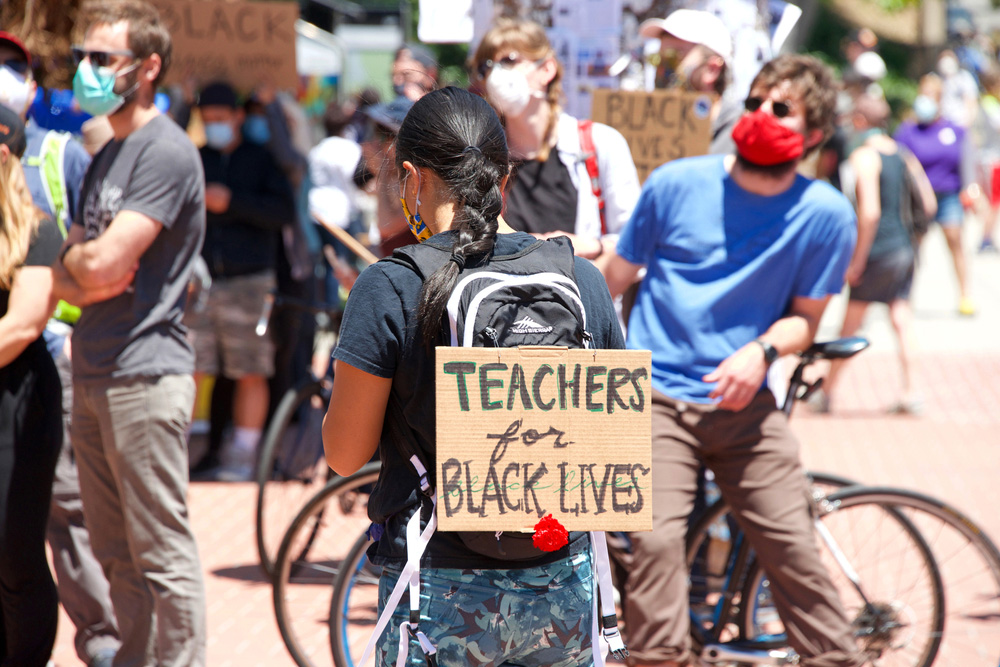“The obligation of anyone who thinks of himself as responsible is to examine society and try to change it and to fight it — at no matter what risk. This is the only hope society has. This is the only way societies change.” — James Baldwin, A Talk to Teachers speech, 1963
Over this past pandemic year, I’ve spent a lot time listening to educators from across Canada who are struggling to support their students.
As someone who has researched how administrators can better support teaching staff and teacher education and leadership, and in my role as a dean of education, I’ve met with many teachers and educators through a weekly web series that I host.
It’s become clear that the effects of the pandemic have challenged almost all students and their families. But, over the past year, there is now ample evidence that supports the anecdotal evidence from my conversations and demonstrates how systemic racism affects educational opportunities and equitable outcomes for many Indigenous, Black and racialized students and their families.
Before the pandemic, a lack of access to reliable, broadband internet had already limited the opportunities for online learning for Indigenous students who live on-reserve. The pandemic has amplified that fact.
When schools stopped in-person instruction, a number of Indigenous colleagues shared with me the struggles of trying to bridge the digital divide that many First Nation communities face. A colleague in Saskatchewan whose First Nation partners with our faculty of education explained how their students had to access high-speed internet by sitting in a car in the school’s parking lot. Many similar stories were told about how teachers were negotiating and innovating around the lack of broadband.
Other educators shared stories of dealing with the challenges of the pandemic in creative ways. One principal who works in a school that serves a predominantly racialized and lower-income urban population organized staff to deliver breakfast and lunch programs to students’ homes.
If we are to have any hope of creating a more equitable and racially just society, we must dismantle systemic racism by restructuring the systems like education that allow it to be perpetuated. This is a tall order but the time before us provides a reckoning that has been a longtime coming.
The tragic deaths of Joyce Echaquan, Eishia Hudson, George Floyd, Breonna Taylor and so many others have catalyzed calls for leaders to do more to address systemic racism. In response, universities and school systems issued solidarity statements and committed to meaningful action.
Anti-racism resources are being ushered into place. This is a good start, but these initial actions should not be mistaken for the hard work that is required to dismantle the structures that uphold racism.
Before we can have anti-racist classrooms and a more equitable education system, teacher preparation programs need to face a reckoning. Canadian universities need to move beyond the comforting rhetoric of equity, diversity and inclusion and confront and change the values, structures and behaviours that perpetuate systemic racism within them.
But we will only make headway if those with power in education first understand how systemic racism is enmeshed in organizational structures, policies and practices and how these helped them both succeed in school and their careers.
Questions about the efficacy of one-shot anti-racism training are not new, but they have been newly raised. Reams of research demonstrate that, in general, short-term educational interventions do not change people’s attitude or behaviours. Even when the training sessions are considered beneficial, the effects may not last long and the immediate effects fade out over time.
Faculties and colleges of education need to embed ongoing anti-racist training and education into their teacher education and leadership development programs. Programs that raise the consciousness of teachers about their own racial biases and prejudices and help move beyond their comfortableness are necessary if teachers are to change some of their attitudes and beliefs to better support racialized students.
There are too few Indigenous, Black and racialized teachers in the system, and as a result all students suffer. More needs to be done to attract Indigenous, Black and racialized individuals into the profession, and this begins with changing how students are invited to consider becoming a teacher. Those with the authority to hire need to actively recruit Indigenous, Black and racialized graduates. Once hired, these new teachers need to be supported and to have mentors like them who have experience navigating the school system.
School divisions need to commit to collect and share data about the streaming of students and disciplinary penalties levied on students based on race and ethnicity, and use the data to improve the opportunities for success for racialized students. Ministries of education need to ensure that the curriculum and recommended learning resources reflect the lives of Indigenous and Black students and students of colour.
If educators want to improve the lives of racialized children, we must make a long-term sustained commitment to dismantle a structure that is not built for their success. Let us draw power from the statement of author and scholar, Ibram X. Kendi, “The only way to undo racism is to consistently identify and describe it — and then dismantle it.”
In the end, the measure of whether or not we have made our education system more equitable and racially just will be demonstrated in the academic success of all of our students. ![]()
![]()
Read more: Rights + Justice, Education

















Tyee Commenting Guidelines
Comments that violate guidelines risk being deleted, and violations may result in a temporary or permanent user ban. Maintain the spirit of good conversation to stay in the discussion.
*Please note The Tyee is not a forum for spreading misinformation about COVID-19, denying its existence or minimizing its risk to public health.
Do:
Do not: